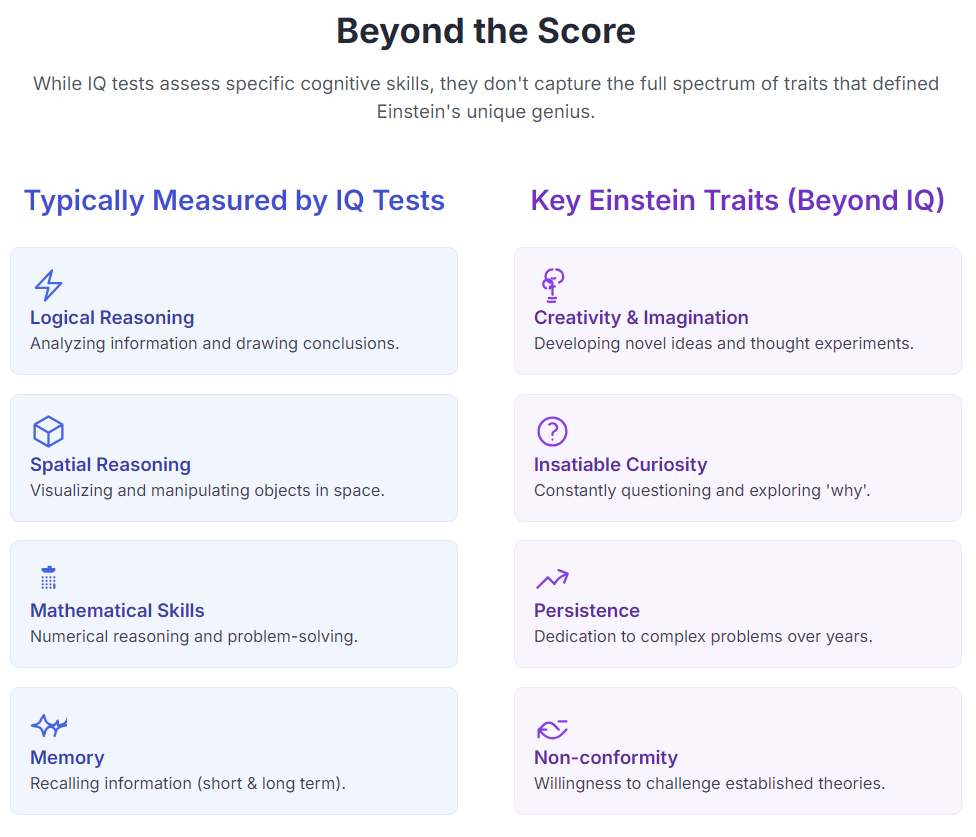Albert Einstein IQ Level and Intellect: Unraveling the Genius of the Man Behind the Numbers
The IQ of Albert Einstein remains a subject of speculation since he never took an IQ test. However, based on historical records, Einstein's estimated IQ is around 160. Despite the absence of concrete data, Einstein's genius is undisputed, given his profound contributions to science. In this article, we explore how IQ scores attempt to measure intelligence and why Einstein's legacy reminds us that a single number can never capture the true depth of human intellect.


Back
5 mins read
Known for his famous equation, E = mc2, his theory of relativity, and the discovery of the photoelectric effect, a phenomenon that significantly shaped the development of modern physics, Albert Einstein's name still lingers on long after his death.
As an influential physicist and a 1921 Nobel Prize winner in physics, Einstein's theories have altered and challenged our perception of reality and birthed a new era of theoretical physics.
We know he is smart, but how smart? What was Albert Einstein IQ? Was Albert the smartest person to ever live?
Well, the most widely reported estimate of Albert Einstein’s IQ is 160. But the truth is that we don’t actually know his exact IQ, since he never took a modern standardized IQ test. In fact, it is highly unlikely he has ever taken an IQ test.
But let's try to dig a little bit deeper and analyze various sources as well as Einstein's achievements to estimate his possible IQ score.
So, What Was Albert Einstein IQ? (According to Different Authors)
Based on his remarkable contributions to theoretical physics through his theory of relativity and spatial reasoning ability, experts widely agree that Einstein's IQ may have been well beyond average, possibly within the “genius” range (basically an IQ over 140).
So, what exactly was Albert Einstein’s IQ? We've analyzed various sources published by different authors to find out how people estimated Einstein's IQ score.
For instance, a 1954 issue of Life Magazine estimated his IQ at 205, while Popular Mechanics in 1962 suggested a score of 207.
Similarly, in 1974, author Mariann Olden also placed Einstein’s IQ at 205.
Later, in 1986, authors Frost and Moore, in their book archived on Internet Archive, proposed a figure of approximately 200.
However, more conservative estimates include Malcolm Gladwell in 2008 suggesting an IQ of 150, and Brian M. Hughes in 2018 estimating it closer to 160.
Of course, these figures are purely speculative, drawn from admiration, retrospective analysis, or narrative framing rather than scientific measurement. Still, if we average these numbers out, Einstein’s “estimated IQ” across these sources lands around 188.
Einstein's Achievements as a Clue to His IQ
Even though the abovementioned numbers are mere speculations since Einstein never took an IQ test, his thought experiments in his younger years have helped scientists estimate his IQ. Jonathan Wai, an assistant professor at the University of Arkansas and a contributor to Psychology Today, points to Albert's thought experiment that led him to formulate the special relativity theory as confirmation of his very high IQ.
Also, a dissection of Einstein's brain revealed that a crucial region of the brain — the area responsible for three-dimensional visualization, spatial relationships, mathematical thought, and other mental processes — was notably larger than the same parietal cortex region among individuals with average intelligence quotient, which further shows that he had a high IQ.
If we were to take an educated guess, Einstein would likely score extremely well on measures of Logical-Mathematical Intelligence.
Another interesting fact pointing to Einstein’s high IQ is that he studied physics. A 2017 ranking of top university majors according to IQ found physics, astronomy, and mathematics among the top majors with the highest IQ in the U.S. So, this is another clue to Einstein's IQ score.
For your information, a score between 90 and 109 is regarded as "normal or average IQ," 110 to 119 is "superior intelligence," 120 to 140 is "very superior intelligence," and a person with an IQ over 145 is considered to have "genius-level" intelligence. It's no wonder that Albert Einstein has forever been referred to as a "genius."
How Important Is a Number on an IQ Test in Determining Einstein's Intelligence?
IQ (Intelligence Quotient) is a score meant to measure reasoning and problem-solving ability. Most IQ tests evaluate:
- Short-term and long-term memory
- Analytical thinking
- Spatial reasoning
- Problem-solving skills
The goal? To provide a standardized, objective way to assess human intelligence—on paper, at least.
When we talk about intelligence, Albert Einstein is often the first name that comes up. He’s become a symbol of genius thanks to theories that completely reshaped physics.
Assigning a number to someone like Einstein feels… limited.
Sure, an IQ score can tell you something about cognitive abilities. But it doesn’t capture:
- Curiosity
- Creativity
- Unconventional thinking
And those were the exact traits that made Einstein a once-in-a-generation thinker.
More Than Just a Number
Einstein wasn’t just brilliant — he was bold. He questioned everything. He saw the universe differently. And that’s not something you can measure on a standardized test.
So while IQ scores may give a glimpse into brainpower, they can’t predict impact. They can’t explain vision. And they definitely can’t define genius.
That said, there is still value in taking IQ tests. The importance of an IQ score can vary depending on the context, but here are some things to consider:
IQ Can Be a General Indicator of Cognitive Abilities
IQ scores are designed to measure a person's cognitive abilities in relation to others in the same age group. They typically assess problem-solving, critical thinking, and logical reasoning skills. In this sense, they provide a general indication of an individual's intellectual potential.
IQ Can Help Identify Educational and Career Opportunities
IQ test scores may be one factor in decision-making processes in certain educational and professional settings. For example, some schools or programs may consider IQ test scores as part of admissions criteria, and certain employers may use them in hiring or promotion decisions.
IQ Has Some Predictive Value in Certain Areas
Research suggests IQ scores can correlate with various life outcomes, such as academic achievement, income level, and job performance. However, it's important to note that IQ is not the only determinant of success; other factors, including motivation, personality traits, socioeconomic background, and choosing the right career, also play significant roles.
Does Albert Einstein’s IQ Score Really Matter?
Einstein's IQ score remains a topic of speculation, but we can all agree that his intelligence was unquestionable. This write-up shows that IQ tests can provide some insights into cognitive abilities and may have implications in certain contexts. However, they are not the sole determinant of an individual's intellectual ability.
Einstein's story serves as a reminder that while IQ scores provide some insights into intellectual and cognitive prowess, they cannot measure the full spectrum of human intelligence or predict the transformative impact of an individual's ideas.
Albert Einstein's exceptional intellectual achievements are not only a product of his special cognitive abilities but also his creativity, critical thinking, innovation, adaptability, curiosity, and fearlessness. While it's fascinating to try to dig up Albert Einstein's IQ, it's equally important to appreciate these other attributes of his personality that contributed to his success.
Also, IQ tests have been criticized for various reasons, including cultural bias, limited scope of measurement, and the potential for scores to be influenced by factors such as test anxiety or socioeconomic status. Additionally, IQ tests may only partially capture certain forms of intelligence, such as social intelligence, emotional intelligence, or creativity. On top of that, some types of intelligence can not be measured with a single number.
Everyone is unique, and IQ scores are just one measure of cognitive abilities among many. It's essential to consider a person's strengths, weaknesses, and potential for growth beyond their IQ score.
Ultimately, your score on an intelligence test should be used to help you identify your strengths and areas of weakness that need more focus and practice. Use it as a guide for self-improvement, not as a determinant of success in all areas of your life.
Keep learning, exercise your brain, and focus more on your cognitive health to increase your intelligence and have better chances of succeeding in life. These things will also help to keep your brain young!
Recommended Reading: How Much Does IQ Matter?


Return to Blog








